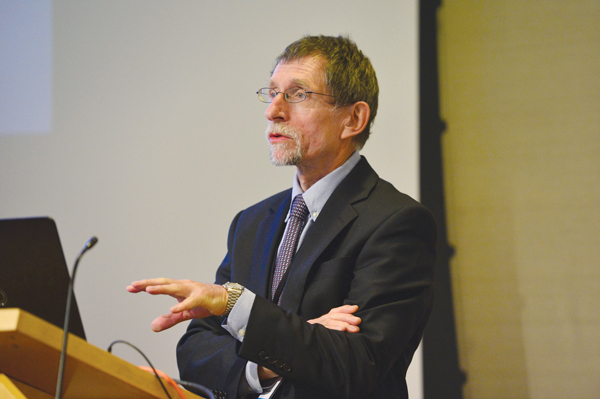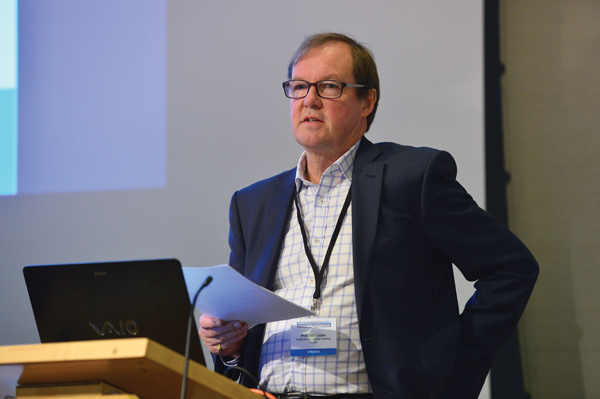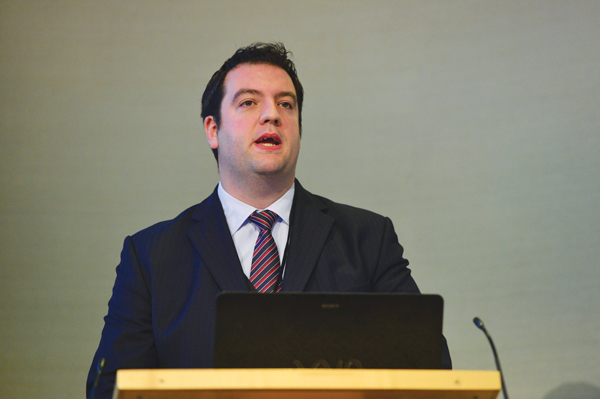State-prescribed textbooks do not have to be oppressive and could be created by teachers competing to get their best activities into them, delegates at a summit in central London heard this week.
Assessment expert Tim Oates told the Politics in Education summit in London that top-performing education systems, such as in Finland and Shanghai, used state-approved textbooks but with “bottom-up” methods.

Schools minister Nick Gibb has repeatedly said he wants to see greater use of “high-quality textbooks” but ruled out state-prescribed texts in a recent interview with Schools Week. “It’s not in our nature as a country to have a Department for Education prescribed textbook,” he said.
But Mr Oates, who has advised the government on curriculum reforms since 2010, said state-approved materials played a key role in the success of other countries and shouldn’t be discounted because they were considered “top-down”.
He said: “[In Finland] the textbooks were looked at by very young pupils, by seven-year-olds . . . and they asked the young people what sort of textbooks they wanted. It wasn’t curriculum control but a bottom-up process.
“In Shanghai, yes, teachers are often on the same page at the same time — but the content of those pages has been developed over the years.”
Teacher research groups in Shanghai schools selected the best lessons and learning activities seen during daily practice and entered these into competitions, he said.
“These are then selected and included in the next round of state-approved textbooks.”
A report into the government’s Workload Challenge, a survey answered by 20,000 teachers, said quality textbooks and “off the shelf” lesson plans helped to reduce work burden.
The report states: “Our maths hubs are already trialling Singapore-based textbooks in the UK, we are exploring further opportunities for the translation of world-class textbooks for use in our schools.”
However, the comments jarred with other speakers sceptical of political involvement in schools.

Professor Bill Lucas, director of the Centre for Real World Learning, proposed an independent body to “cast its eyes over the education institution” and give judgments about the impact of government policies, similar to the Office for Budget Responsibility’s independent reports on Treasury decisions.
Sir John Dunford, chair of Whole Education and the government’s most-recent pupil premium champion, also advocated for the creation of a new organisation – an Evidence Centre for Education, headed by a chief education officer – to advise on policy directions.
“We are still in a situation where teachers are one type of people and researchers another.”

However Jonathan Simons, director of education at Policy Exchange, reminded delegates that there were more than 12 million parents in England whose concerns might be more relevant to the government than those of half a million teachers.
Main pic: From left: Schools Week editor and chair of Politics in Education summit Laura McInerney, shadow schools minister Nic Dakin, and Henry Stewart







Of course there are more parents than teachers! That’s stating the obvious. And, yes, those parents want the best teaching for their children. But Jonathan Simons appears to assume teachers are at odds with parents and the Government should only ‘listen’ to the latter. But recent Governments, Conservative, Coalition and Labour, have listened to neither parents nor teachers. They have attempted to foist their own view of education policy on to schools. How many parents know, for example, that Policy Exchange, of which Simons is now director, published a document before the 2010 election saying schools in England should be allowed to make a profit and that Gove, speaking at the document’s launch, said he would allow Serco to run schools? How many parents realise academization can result in less choice and diversity as academies in chains begin to resemble clones of each other? And when parents oppose academization they are not listened to but described as ‘enemies of promise’. Indeed, the Education and Adoption Bill proposes to ignore parents altogether.
I thought ‘freedom and autonomy’ were the watchwords. But state-prescribed text books are the opposite of this. Wouldn’t be anything to do with Cambridge Assessment’s push for ‘real’ textbooks, could it, supported by research (http://www.cambridgeassessment.org.uk/news/new-research-shows-why-textbooks-count-tim-oates/) done by Cambridge Assessment’s Tim Oates and supported by schools minister Nick Gibb? Publishing state-prescribed textbooks would do wonders for publishers’ profits.
However, when schools minister Liz Truss made similar points about textbook use earlier, she forgot to include figures for English teachers who used textbooks to supplement lessons rather than just base entire lessons on them. She also forgot the widespread supplementary use of the condemned worksheets in other countries as I point out here. http://www.localschoolsnetwork.org.uk/2014/01/trusss-textbook-quotes-not-wholly-accurate-minister-relied-on-partial-interpretation-of-timss-tables/http://www.localschoolsnetwork.org.uk/2014/01/trusss-textbook-quotes-not-wholly-accurate-minister-relied-on-partial-interpretation-of-timss-tables/
If you want true bottom up access then publish them on the internet with a CC license – somehow I don’t think that will happen.
That might well be a viable solution. So within that framework you can publish modular exemplars and links to new resources created by teachers for update.
But again – I do not think the gov’t or exam boards have the courage or the innovative mindset to do that. I suspect this will merely be another commercial channel riding on teachers’ expertise.
Having said that the Maths Hubs are producing materials like this > http://mathshubs.org.uk/what-maths-hubs-are-doing/national-curriculum-assessment-materials/ but they are only in PDF format not open document format. Crown copyright is close to Creative Commons but the pictures are Copyright OUP.
I can’t imagine anything more dull for both the student and the teacher than learning from a state-prescribed text book in every subject in every lesson of the day. It would also make people very dull, if we all knew the same stuff from the same book, what on earth would we talk about? One of the greatest failures in our education system at the moment is not extended and stretching the brightest students. We need to model the independent search for knowledge to these students by drawing on different sources. This will help students when they want to apply to the top universities (Oxbridge anyone?). It is also the lifeblood of subjects like Geography which are evolving and changing with every news bulletin.
Lucy – A cynic might say that state-prescribed textbooks would allow unqualified teachers to deliver the content. As you imply, this would be the kiss of death to inspirational teaching.
The danger of such imposition is that pupils would only be presented with the state-endorsed view and that’s dangerous. At the same time, you’re right that such books in some subjects would be out-of-date as soon as they were published. I used to teach Business Studies and found the media had more topical examples of business practice than the textbooks (and the latter rarely had anything about business ethics so I designed my own resources).
Hi Lucy, hi Janet! Great so see you both chatting in here. Janet – Lucy runs a brilliant website and service for ambitious students stuck in schools trying to keep everyone above a ‘C’ (see http://www.lifemoreextraordinary.com/). Lucy – Janet is well on top of education news bringing her knowledge to question mainstream reporting and she’s often in the LSN (google “Local Schools Network”). As for the Summit, I found that when all the parts are brought together we have an interesting picture emerging.
Here’s an extract form my summary of Tim’s presentation (can see in full here: http://leahkstewart.com/politicsineducation/) “(Tim) argued that Governments require curriculum control to influence curriculum coherence, though this need not be top down control, nor should it be exercised solely through curriculum content revisions. Governments, Tim proposed, must have curriculum control because of their inescapable moral duty to ensure all students access all concepts and subjects they are entitled to.”
Last summer I spoke with a department head at Pearson and really thought they were going to start an ‘Open Source’ text book project, not unlike what Tim is talking about. Too risky. Too out there, it seems, for such an established company. What a shame. Here was my video pitch anyway, after the exciting conversation at the Festival of Education: https://youtu.be/5NQeKKkaqaQ